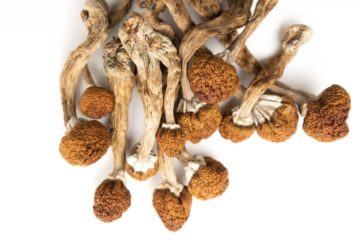Shawna Williams in The Scientist:
 For years, some researchers have looked to psychedelic drugs, including psilocybin (the active ingredient in so-called magic mushrooms), as a potential treatment for some psychiatric conditions. The largest trial to date of psilocybin for depression, published today (November 3) in the New England Journal of Medicine, finds that a dose of synthetic psilocybin combined with counseling did alleviate symptoms for some patients. But for some participants who did respond, the effects wore off within 12 weeks of the treatment.
For years, some researchers have looked to psychedelic drugs, including psilocybin (the active ingredient in so-called magic mushrooms), as a potential treatment for some psychiatric conditions. The largest trial to date of psilocybin for depression, published today (November 3) in the New England Journal of Medicine, finds that a dose of synthetic psilocybin combined with counseling did alleviate symptoms for some patients. But for some participants who did respond, the effects wore off within 12 weeks of the treatment.
“It’s a big step forward for the field of psychedelic research and depression treatment,” Jimmy Potash, who oversees psychedelics research at Johns Hopkins but was not involved in the study, tells STAT. The durability of the response is “not as good as you’d like, but it’s still quite good,” he adds. The Phase 2 clinical trial, funded in part by the mental health care startup Compass Pathways, which makes the synthetic psilocybin used in the study, included 233 patients for whom at least two depression medications had not worked. The participants were randomly assigned to receive psilocybin at one of three dosing levels: 25 mg, 10 mg, or 1 mg (used as a control). Volunteers in all three groups received counseling before and after the psilocybin use and were monitored during their experience with the drug.
Three weeks after treatment, all three groups saw a fall in their average score on a standard rating scale of depression indicators (indicating less severe cases) relative to their scores prior to treatment, according to the paper, with the largest improvement in the highest-dose group. STAT notes that 29 percent of those high-dose participants were in remission at the three-week mark, a number that dropped to 20 percent at 12 weeks, while 37 percent had their depression score halved by the three-week mark.
More here.
